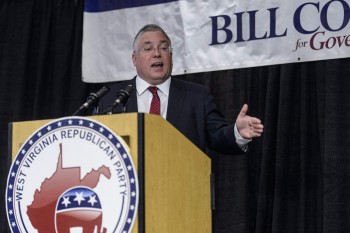
Patrick Morrisey, the West Virginia attorney general, gives an acceptance speech for a second term in office during the West Virginia Republicans’ election party in a ballroom at the Embassy Suites in downtown Charleston on Tuesday.
CHARLESTON, W.Va. — After one of the state’s most expensive campaigns this election cycle, Republican Attorney General Patrick Morrisey was re-elected for a second term Tuesday night, defeating Democrat Doug Reynolds.
The Associated Press called the race for Morrisey at a little after 10 p.m., just minutes after Reynolds conceded.
With 88 percent of precincts reporting Tuesday night, Morrisey had 51 percent of the vote, or 315,962 compared to Reynolds, who had 42 percent of votes, or 259,880, according to unofficial results from the AP. Morrisey spoke to state Republicans who gathered at the Embassy Suites hotel in Charleston on Tuesday. He couldn’t immediately be reached by the Gazette-Mail for comment.
After conceding, Reynolds told the newspaper he was disappointed in the results.
“We’re not going to win this campaign,” Reynolds said. “It’s been a hard-fought race. I’m obviously disappointed … it just wasn’t in the cards.”
Libertarian Karl Kolenich and Mountain Party candidate Michael Sharley both had 3 percent of the vote.
Morrisey, who defeated 20-year incumbent Darrell McGraw in 2012, has spent about $1 million of his own money on his campaign — but the incumbent is backed by the Republican Attorneys General Association. And the national group has thrown in more than $6 million to help Morrisey protect his seat.
As of Tuesday, RAGA had spent $6.4 million on Morrisey’s re-election campaign, finance reports show. The group is funded by coal operators, pharmaceutical companies and Republican donors Charles and David Koch.
“It was a pretty staggering amount,” Reynolds said of the amount RAGA poured into Morrisey’s campaign. He called the amount he spent on his election “adequate.”
“I’m sure [RAGA] wouldn’t have spent that amount if they didn’t think it would help [Morrisey’s] campaign,” Reynolds added.
Morrisey and RAGA’s messages have focused on trying to paint Reynolds as a close ally of Democratic presidential nominee Hillary Clinton, pointing out he donated money to Clinton’s campaign in 2007. Morrisey has attacked Reynolds for inheriting his money from his father and for not working as a practicing lawyer in recent years.
Reynolds, a state delegate, businessman and millionaire from Huntington, has contributed about $3 million of his own money into his run to unseat Morrisey, according to state campaign finance reports. Reynolds is a controlling partner in HD Media Group, which owns The Herald-Dispatch in Huntington and Wayne County News, and is the president of Energy Services of America.
Reynolds has used his political spending to run TV advertisements about Morrisey’s ties to opioid wholesalers that were sued by McGraw for dumping millions of pain pills into West Virginia. Reynolds has criticized his opponent for not fully stepping aside in one of those lawsuits against Cardinal Health, which Morrisey and his wife once represented as lobbyists.
Last month, the two candidates met on the state Capitol steps for a debate in front of several dozen people, in which they largely rehashed the attack ads that have swamped television stations statewide. Morrisey tried to make the argument Reynolds wouldn’t have challenged the Clean Power Plan, the pending federal regulations to curb carbon emissions from power plants. Morrisey’s office sued over implementation of the regulations, which President Barack Obama’s administration has called the first step in combating global warming. The case was argued before the U.S. Fourth Circuit Court of Appeals in Richmond, Virginia, in September.
Reynolds, though, said during the debate that he would continue to litigate against those regulations and called himself an “avid defender of our coal industry.”
When asked during the debate if either candidate is concerned about the effects of global warming, Morrisey said those types of questions “divert attention from the matter at hand.”
Reynolds started out by saying that the body of evidence — which now includes 15 of the 16 hottest years on record occurring since 2001 — shows that climate change is a serious concern. But he went on to suggest that burning coal isn’t contributing to rising global temperatures, even though carbon emissions from power plants make up one of the largest sources of heat-trapping gases nationally and worldwide.
“There is a lot of evidence that there is climate change,” Reynolds said. “The question is, if we all stopped mining coal, would it change that? Absolutely not.”
Reach Kate White at [email protected], 304-348-1723 or follow @KateLWhite on Twitter.






